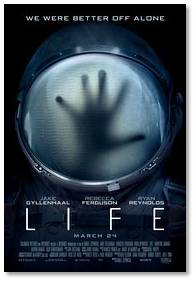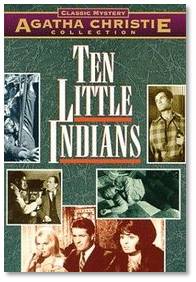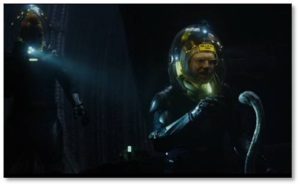 We went to see Life, the new science fiction movie this weekend. I intentionally did not read any of the reviews because I didn’t want to know what to expect—beyond the trailer we saw earlier. Also, I never trust mundane reviewers to grasp science fiction and get the review right. They are not typically people who looked up at the stars when they were kids and thought, “I want to go there.”
We went to see Life, the new science fiction movie this weekend. I intentionally did not read any of the reviews because I didn’t want to know what to expect—beyond the trailer we saw earlier. Also, I never trust mundane reviewers to grasp science fiction and get the review right. They are not typically people who looked up at the stars when they were kids and thought, “I want to go there.”
Life is technically a science fiction film but it got a few critical hits for not being original. Well, duh, it’s not. Really, Life is a 10 Little Indians movie in space. The requirements for this plot structure are:
- A group of people confined in a small space—a crew, group of friends, travelers, etc.
- A threat of some kind that begins killing them one by one—monster, virus, alien, demon, crazed Hillbilly psychopath
- A spoiler who breaches the defenses and allows the threat in—cyborg following orders, businessman who wants to monetize the threat, scientist in denial
The Earth-bound Movies
 The original movie, based on an Agatha Christie novel of the same name, spawned the plot and turned it loose in the Hollywood world.
The original movie, based on an Agatha Christie novel of the same name, spawned the plot and turned it loose in the Hollywood world.
A lot of horror movies have adapted this plot with teenagers falling to murderers of various kinds. We have no interest in those films although I did love Joss Whedon’s wickedly funny parody, Cabin in the Woods.
Monster movies like Predator also use this setup to great effect and even supernatural flicks such as The Haunting (The 1964 black-and-white original, NOT the remake.) have used it to good effect.
10 Little Indians in Space
Life is not the first time 10 Little Indians has gone to space. Think of Pitch Dark and, of course, the ne plus ultra—Alien and its arguably superior sequel, Aliens. Even Gravity touched on some of its aspects.
Audiences enjoy 10 Little Indians plots because we identify with the group, yell at the spoiler not to do it, wonder how we would survive, and root for at least one person (and sometimes a cat) to make it. That mindset works here as well.
In this movie, the small space is the International Space Station (ISS), the group is a crew dedicated to analyzing soil samples from Mars in a safe environment away from Earth, the threat is an alien life form and the spoiler is a person who’s way too focused and more than a little oblivious to behaviors outside of the familiar.
The synopsis of the movie says it all:
“A team of scientists aboard the International Space Station discover a rapidly evolving life form, that caused extinction on Mars, and now threatens the crew and all life on Earth.”
Near-real Science Fact
I would not call Life a science fiction movie. It’s actually closer to Near-real science-fact. The ISS exists. We are planning to go to Mars. Bringing back a soil sample and analyzing it before we put boots on the ground is a really good idea. Ditto, doing the analysis in a closed environment away from Earth.
Like Andy Weir’s The Martian, the events in Life could happen in our lifetime and without any big stretch of imagination, much less suspension of disbelief. We think Mars has no life but, then our scientists also thought there couldn’t be life in the black depths of the ocean near “black smokers,” hydrothermal vents that spew out black boiling water. Boy, were they wrong.
In fact, black smokers show a great example of incorrect assumptions based on what scientists thought would be the case rather than observed reality. If our experts could be so off-base about an environment here on good old Earth, how much greater is the possibility of deluding ourselves when we climb out of our gravity well to visit other planets?
Think of the scientists in Prometheus, gushing over a slimy, snaky creature that’s slithering way too fast in their direction. “It’s beautiful,” they exclaim. No, it’s not. It is what it is and you’re safer acknowledging that you have no idea what it is or what it can do. And then one of them sticks his face in a space egg. Has no one in the space program ever seen Alien?
Of Bites and Butterflies
There’s a similar scene in this movie where the exobotanist calls the alien life form beautiful. Really, dude, it’s not. But calling it beautiful makes it seem harmless and even friendly, like a butterfly. That leads to believing, of course, that the unknown life form is as innocuous as a butterfly. Thus he acts as though the creature in its early stage follows his finger because it wants to make contact rather than because it’s hungry. He never seems to think that contact might involve some really unpleasant consequences.
Is this scientific behavior? I sure hope not. Ditto when he decides to interfere with the life form in a dormant state. Would proper scientific behavior not be to observe and record the dormant state while it lasts? After all, if you interfere with the caterpillar’s dormant state you don’t ever see a butterfly. But if you interfere with a sleeping snake, you just might get bitten.
But I digress.
Do I Recommend Life?
Life is a perfectly acceptable and enjoyable version of 10 Little Indians in space — not as good as Alien, not as bad as Prometheus. The ISS crew is likable, professional and competent if not particularly charismatic. The special effects team got weightlessness down perfectly and you really feel like you’re floating through the ISS.
The Martian life form is suitably original and creepy—resembling neither a snake nor the Alien Queen—and threatening. The ending is very well done.
I recommend Life to people who enjoy suspense regardless of the environment. If you liked The Martian and Gravity, you will most likely enjoy Life as well. The critics found it grim but, hey, that’s the nature of a 10 Little Indians plot.



I was going to pass on this because it sounds too much like a rewrite of the Alien based movie. I thought Aliens was the best one, and that “Prometheus” had a lot of potential in the beginning, but really stunk overall.
So how do the “scientist” know tat this life form “caused extinction on Mars”?
They don’t “know.” They speculate.
This was so fun to read!!
Thanks! It was fun to write, too.